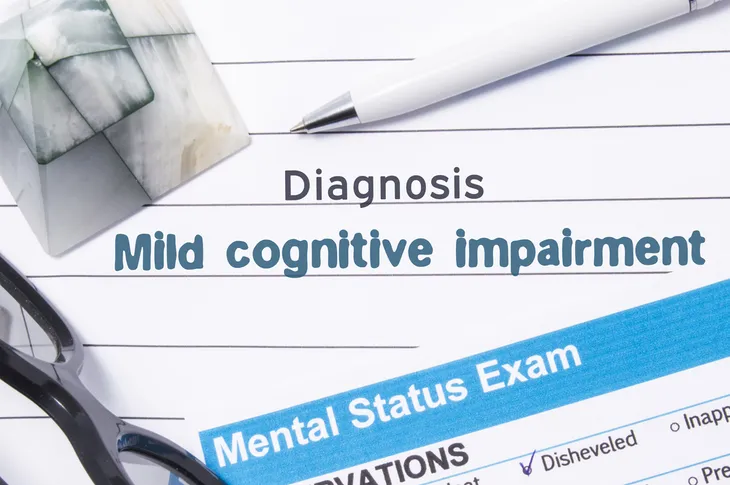- While forgetfulness can be a normal part of aging, it can also be an early warning sign of mild cognitive impairment.
- Mild cognitive impairment is also known as the stage between normal cognitive decline that occurs with aging and the more serious form of decline, dementia.
- Mild cognitive impairment can have a variety of warning signs that indicate the condition is creeping in, such as memory loss, language problems, and change in character.
It’s normal to forget things from time to time, such as misplacing your car keys or sunglasses. Sometimes we even forget people’s names. We’ve all been there! While forgetfulness can be a normal part of aging, it can sometimes also be an early warning sign of mild cognitive impairment (MCI).
If you’ve noticed a slight decline in your memory and ability to think clearly, you might have mild cognitive impairment. The condition may lead to dementia too which is why it’s important to get informed. Let’s take a look at the common warning signs and causes of MCI, the possible treatment options, and what it means for your future.
What Is Mild Cognitive Impairment?
Mild cognitive impairment is a condition that causes slight cognitive changes — enough that it’s noticeable to the individual affected, and the loved ones of the individual. The good news is these changes aren’t severe enough to interfere with your daily activities.
Mild cognitive impairment is also known as the stage between normal cognitive decline that occurs with aging and the more serious form of decline, dementia. The Alzheimer’s Association estimates 10 to 20-percent of individuals over the age of 65 may have mild cognitive impairment.
Mild Cognitive Impairment vs. Normal Aging: What’s the Difference?
It’s important to establish that mild cognitive impairment is different from the expected decline caused by aging. Some gradual cognitive decline is expected as we age, such as it may be harder to learn new information, our mental processing may slow, our performance may slow and we may become more easily distracted, explains the Cleveland Clinic.
The key difference between normal decline and mild cognitive impairment, is that cognitive decline caused by normal aging doesn’t affect “recognition, intelligence, or long-term memory,” explains the source. It also won’t interfere with your daily activities or ability to function. In normal aging, your forgetfulness may be occasional whereas, in mild cognitive impairment, it’s more consistent.
The Warning Signs of Mild Cognitive Impairment
Mild cognitive impairment can have a variety of warning signs that indicate the condition is creeping it. Experts typically classify the symptoms in two categories known as amnestic MCI and non-amnestic MCI.
In short, amnestic MCI is a category that mostly affects memory, such as forgetting certain details. Whereas non-amnestic MCI has to do with thought processes, such as completing complex tasks, explains Healthline. Let’s take a look at a few specific warning signs that may indicate mild cognitive impairment is on its way.
Memory Loss
Memory loss is one of the telltale signs of mild cognitive impairment. Memory loss may present itself as forgetting appointments, the names of friends or family members, or forgetting conversations. Misplacing items frequently is also another common sign to watch out for.
If you or a loved one is experiencing consistent memory loss, it’s time to see a doctor. If you can, keep a log of every time you forget something important and share that information at your appointment.
Language Problems
Mild cognitive impairment may also cause language problems. If you have difficulty coming up with a simple, specific word, this may be a warning sign.
Aubry Alvarez-Bakker, Ph.D., a neuroscientist, and research lead at Yes Supply Co. explains to Eating Well, “Even a simple undertaking, like naming a kitchen appliance, engages our brain networks extensively, making it a sensitive indicator of early decline.” While the exact cause of this isn’t fully known, the source says, language decline often originates in the left side of the brain.
Difficulty With Reasoning, Judgment, and Attention
Do you have difficulty making decisions more often than not? Perhaps, you also struggle with problem-solving, or planning. These could all be key warning signs that you have mild cognitive impairment.
The condition can also cause difficulty with attention span. You may lose focus or get easily distracted, more than you used to. Pay attention to these signs and talk to your doctor if they develop.
Loss of Interest in Things You Used to Love
It’s not uncommon to give up hobbies every now and again, however, if you or a loved one is suddenly losing interest in the things they used to love, then this may be a warning sign of MCI.
Eating Well explains, “A sudden loss of interest in activities you used to love, or a willingness to throw in the towel easily, is reported in up to half of all cases of dementia.” Unfortunately, withdrawing from stimulation is also known to speed up the decline process, says the source. So be on the lookout for this symptom, and notify your doctor if it develops.
Change in Character
If you or a loved one starts showing personality changes, this may be a warning sign of cognitive decline. Eating Well says because the changes can be so subtle, it’s often overlooked and missed as a sign. This is also because it can often be blamed on other factors like stress, explains the source.
Be on the lookout for a change in character such as suddenly swearing regularly, or being quick to anger. Withdrawing from social activities or interactions can also be a warning sign especially if you or your loved one used to be an extroverted individual.
Chronic Worrying
It’s completely normal to worry or feel stressed from time to time but chronic worrying can keep your fight-or-flight response in overdrive, explains Eating Well. And “symptoms of chronic stress can mimic cognitive decline, such as forgetfulness and inattention,” explains the source.
Caroline Leaf, Ph.D., a neuroscientist, and author of Cleaning Up Your Mental Mess tells Eating Well that uncontrolled, toxic thinking may lead to low-grade inflammation across the body and brain. Over time, this may impact your cognitive health as well as your ability to remember and recall information. Leaf says, if left unmanaged, it can lead to varying levels of cognitive decline. Be on the lookout for this warning sign, and make sure you manage the underlying cause to help prevent the development of MCI.
What Causes Mild Cognitive Impairment?
The Alzheimer’s Association points out that the exact cause of mild cognitive impairment is not yet fully understood. That said, the source also says many cases result from “brain changes occurring in the very early stages of Alzheimer’s or other neurodegenerative diseases that cause dementia.”
The Cleveland Clinic also points out that there are a small number of cases that show another condition may be causing the symptoms of mild cognitive impairment such as depression, sleep apnea, thyroid problems, kidney problems, or liver problems, as well as a history of alcoholism. Conditions that affect blood flow in the brain, such as blood clots, stroke, or tumors may also be linked.
Does Mild Cognitive Impairment Always Lead To Dementia?
While mild cognitive impairment can be a worrisome condition, you might be wondering, are you doomed for dementia? While it’s not guaranteed, it is possible. The Cleveland Clinic explains, “researchers have now determined that for most patients with mild cognitive impairment (MCI), the MCI is a point along the pathway to dementia.”
The source also notes 7.5-percent of individuals 65 or older will develop dementia in the first year after a diagnosis of mild cognitive impairment. That percentage increases in the second year to 15-percent. Finally, in the third year following a diagnosis, 20-percent of individuals will develop dementia.
Diagnosing Mild Cognitive Impairment
If you suspect you may have mild cognitive impairment, book an appointment with your doctor for a diagnosis. While there is no specific test to confirm you have MCI, your doctor will use their clinical judgment along with a medical assessment to determine a diagnosis. They will likely rule out other causes through tests such as magnetic resonance imaging (MRI) scan, computed tomography (CT) scan, blood tests, mental status testing, neurological exams.
The Mayo Clinic also says doctors may use a list of criteria to determine a diagnosis which includes:
- You have difficulty with memory or other mental functions.
- You are declining over time.
- Your daily activities and overall mental function aren’t affected.
- Mental status testing shows a mild level of impairment for your age and education level.
- Your diagnosis isn’t dementia.
Treatment Options
Unfortunately, there are currently no approved medications to treat mild cognitive impairment. The Cleveland Clinic says a few trials tried to treat MCI with medications for Alzheimer’s disease, however, the results were mixed.
On the other hand, if it’s been determined that your case of mild cognitive impairment is caused by a treatable medical condition, you will be treated for that condition, such as depression, high blood pressure, or sleep apnea.
Can Mild Cognitive Impairment Be Prevented?
You can’t always prevent mild cognitive impairment, however, the Mayo Clinic says some research has found certain environmental factors may affect your risk of developing it. With this is in mind, you may be able to help prevent MCI by:
- Reducing your risk of a head injury.
- Not smoking and quitting if you do smoke.
- Avoiding excessive alcohol consumption.
- Restricting your exposure to air pollution.
- Managing certain health conditions, such as high blood pressure, diabetes, depression, and obesity.
- Getting good quality sleep.
- Engaging socially with other individuals.
- Engaging in physical activity regularly.
- Exercising your brain regularly.
- Eating a healthy diet.

















